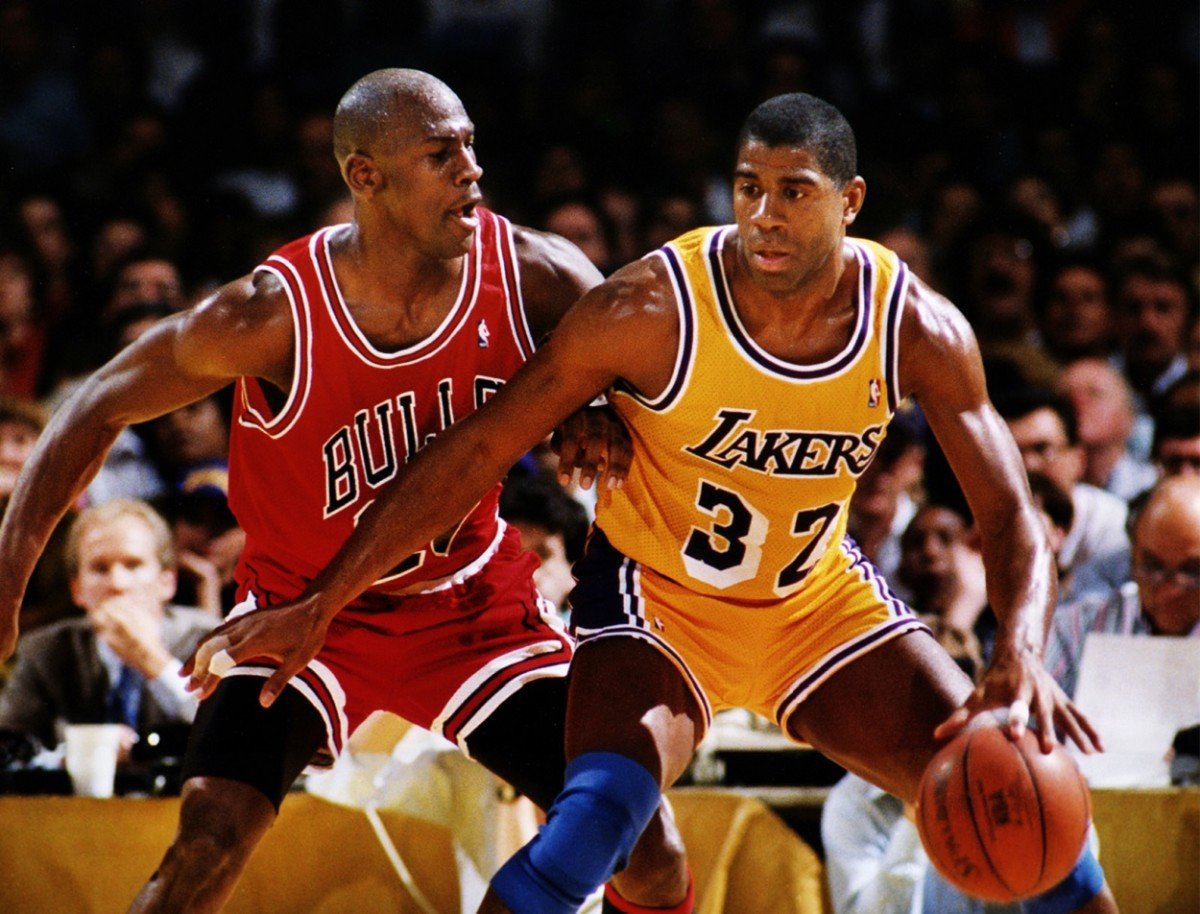Genius Makers
Michael Jordan, the NBA’s all-time leader in points per game vs. Magic Johnson, the NBA’s all-time leader in assists per game.
NBA teams score a lot of points, usually 100+ per game.
Most teams have one or two players do most of the scoring, and other players contribute where they can. The leading scorer on each team usually averages >25 points per game.
Over 15 seasons, Michael Jordan averaged 30.1, the most ever.
High school basketball is similar to NBA basketball, but there are a few differences. For example, high school games have 16 fewer minutes, and the courts are 10’ shorter.
Also, high schoolers tend to score fewer points. More like 50 per game instead of 100, and it’s unusual for any one player to average 25+ points per game.
But when Earvin Johnson, Jr. was in 8th grade, he scored 48 points in a single basketball game.
And it wasn’t a fluke. He could score at will, and by the time he arrived at Everett High School, the newspapers were calling him Magic.
Magic’s coach told him, “Every time you get the ball, I want you to take the shot.”
“If we had 50 (points), I would have 42 of them.”
- Magic Johnson, reflecting on his experience as a young player
Magic and his team won nearly every game.
Magic scored nearly all the points.
Before the world came to know him as Magic, Earvin Johnson was one of Sports Illustrated's Faces in the Crowd in 1977.
One evening, after a high-scoring game, Magic noticed the faces of his teammates’ parents. Despite the victory, they didn’t look happy.
They looked disappointed.
They’d come to see their own kids play, not just to watch Magic Johnson.
Reflecting on that experience, Magic said, “I made a decision at this very young age that I would use my God-given talent to help everyone on the team be a better player.”
He focused less on scoring, and he focused more on helping the people around him score.
… and that’s how the greatest point guard in NBA history was born.
Shortly after that decision, he found himself double-teamed on every possession in a big game. They held Magic to just 10 points, but he had 15 assists and his team won 81-45.
The newspapers in Michigan continued to call him Magic, but for a different reason. He magically elevated the level of play for his teammates.
Magic Johnson would go on to win an NCAA championship at Michigan State and become the NBA’s all-time leader in assists per game.
Multipliers
In her book Multipliers: How The Best Leaders Make Everyone Smarter, author Liz Wiseman makes a case that the best leaders operate like Magic Johnson.
She calls these leaders Multipliers - leaders who use their intelligence to amplify the smarts and capabilities of the people around them.
Genius Makers.
Diminishers
Wiseman contrasts Multipliers with Diminishers - leaders who drain intelligence, energy, and capability from the people around them.
You know who I’m talking about… the leaders who need to be the smartest person in every room. You’ve worked with them.
Bullies.
Ball hogs.
According to Wiseman’s research, Multipliers are different.
They talk less. Intervene less. They give fewer answers. They dispense ideas in small doses.
Multipliers question more. They nudge and guide more. They see more potential and get more out of us. They make us feel safe. They see talent we didn’t know we had.
And after a conversation with a multiplier, we leave feeling like maybe we’re the smartest in the room.
Here are 5 things Multipliers do differently
1. - Empire Builders vs. Talent Magnets
Diminishers are empire builders. They sometimes recruit top talent, but their primary motivation is to advance their own career.
Multipliers are talent magnets who hire stars, help develop their strengths fully, and remove obstacles to help them succeed.
2. - Tyrants vs. Liberators
Diminishers are tyrants who create unsafe environments. They shut down ideas. Their people tell them what they want to hear because they’re afraid of doing or saying the wrong thing.
Multipliers are liberators. They’re hard on issues but easy on people. They create safe spaces for their teams to take risks and fail.
3. - Know-It-Alls vs Challengers
Diminishers ask questions to test us. They’re know-it-alls.
Multipliers ask questions to test assumptions. They’re challengers.
4. - Decision Makers vs Debate Makers
Diminishers may involve others, but they dominate and make decisions independently. They’re decision makers.
Multipliers facilitate real, rigorous debate to draw out the wisdom of a team. They’re debate makers.
5. Micromanagers vs Investors
Diminishers are micromanagers who create confusion by jumping in and out of projects. They intervene if their instructions aren’t followed.
Multipliers are investors. And if something isn’t going as planned, they probe and ask questions. They resist jumping in to play the game themselves.
And over time, they get results.
Magic Johnson was a 5x NBA Champion, 3x MVP, and 12x All-Star. He’s widely considered one of the best players of all time.
And he averaged 19.5 points per game.
He was never his team’s leading scorer.
Personal update: I took a few months off from this newsletter to focus 100% of my energy on building Tailwater Dental Partners. And it’s working. We’re growing.
As the new year approaches, I’m writing again. Maybe not every week, but I’ll show up in your inbox regularly. If you’re reading this, thank you. I’m grateful for you.
And if you like what you’re reading, sign up below and/or share this with friends who might also like this stuff.

